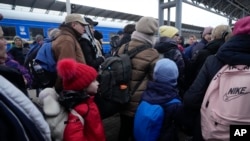As the Ukrainian exodus continues, Chinese citizens in Ukraine have been sharing with VOA their experiences of fleeing the war.
Wang Jixian is a Chinese citizen in Odesa, Ukraine. He told VOA that he learned of the need to evacuate only 20 hours before Russia invaded Ukraine on February 24. He said, "We didn't receive the notification. We checked the website. We kept refreshing the app of that website to see if it had a notification."
Wang said when the flighting started, the embassy told him and fellow Chinese citizens to "evacuate on their own," and that now it is too late even if the Chinese Embassy sends resources to help evacuate as it is difficult to leave the city and the country.
Some 6,000 Chinese citizens were living in Ukraine before Russia sent troops into the country.
Among them is a Chinese student in Kyiv who does not want to use his real name and calls himself "Long Bai." He arrived in Ukraine six months ago. He told VOA that when the Russians launched their military invasion on February 24, the Chinese embassy told him to wait for further guidance.
He said he was left with two options, "One was to go west by yourself, and the other was to settle at home for two weeks and wait for the embassy's notification." He said he decided to go west.
Long Bai said he was surprised to receive a notice from the Chinese embassy on February 28, four days after the invasion started, that Chinese citizens were to be evacuated to Moldova. By that time, he was already on a train leaving Kyiv.
For Chinese citizens in Ukraine, news of what is happening has sometimes been confusing, causing even more anxiety. Radio Free Asia, citing Ukrainian media, reported "four Chinese students have been killed following a Russian attack on their dormitory building," though the Chinese state media, Global Times, disputes that claim, calling it "fake news."
Some Chinese students in Ukraine using the social media app WeChat believe the news to be true, with someone texting: "I must go back to China, four people have been killed."
In a March 1 phone conversation with his Ukrainian counterpart, Chinese Foreign Minister Wang Yi stated that "the Chinese government attaches great importance to the safety of Chinese citizens in Ukraine and is concerned about their safety at all times."
On March 3, Chinese state media Global Times wrote that the Chinese embassy confirmed that almost all the Chinese citizens in Ukraine had been evacuated and "the Ukrainian government has arranged a special train for the evacuation of 180 Chinese students in Kharkiv."
Sino-Russian relations
While China has tried to portray itself as a neutral party in the Ukraine conflict, with President Xi Jinping calling for "maximum restraint" and open to playing a mediating role, the Sino-Russian relationship has been described as a friendship with "no limits" and "no 'forbidden' areas of cooperation," as put forth in a joint statement following a meeting between Xi and Russian President Vladimir Putin.
Observers say Beijing has been carefully crafting its messaging, using Russia's words calling the war a "special military operation" instead of an "invasion," which is commonly used in the West to describe Russia's role in the war.
China abstained from the U.S.-backed U.N. Security Council resolution in condemning the Russian invasion. Russia vetoed the resolution.
The New York Times reported on March 2, citing Western intelligence, that Chinese officials asked Russian officials not to invade Ukraine until after the Olympics, to which Chinese Foreign Affairs Ministry spokesperson Wang Wenbin responded by calling it "pure fake news."
He Anquan, founder of the Shanghai National Party, traveled from New York to Ukraine to protest the war. He told VOA he had spoken to several Chinese students studying in Ukraine who are worried about being targeted because they are Chinese.
"Why are the Chinese students in Ukraine so worried? That's because they are afraid that because of the Chinese government's policy, they'll experience backlash in Ukraine," he said.
He told VOA that although he had not experienced obvious hostility, there seemed to be an unease among the Ukrainian populace. He said in one incident, when he started taking pictures with his phone, “some local people expressed their concern. They asked me not to take pictures and told me because it is wartime and hope that I understand,”
Staying put or new ventures
Wang Jixian decided to stay in Odesa with his family and friends, saying that since his Ukrainian neighbor went to war, he will help take care of the neighbor's young daughter along with her grandparents.
Long Bai, now in Romania, said he received a warm welcome from the Chinese Embassy and local Chinese business community there but that he wants to return to China, even with a ticket costing $2,850.
Fan Ye contributed to this story.





